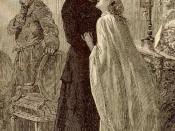Victor Hugo's characters in Les Miserables reform throughout the novel. The theme of "reform" can be seen many times throughout the novel. Two main characters, Jean Valjean and Javert, both reform their lives in different ways.
Jean Valjean began the story as an ex-convict who was searching for food and shelter after being in the galleys for a large portion of his life. Unfortunately, he failed to receive compassion from any lodging, or home. After he found shelter within the Bishop's home, he expressed his gratitude for accepting him. At this point the Bishop told him, "You have left a place of suffering. But listen, there will be more joy in heaven over the tears of a repentant sinner"(28). Valjean could have taken this as good advice, but it didn't stop him stealing the Bishop's candlesticks later on. A short while later Valjean is caught. He was brought to the Bishop, but the Bishop chose to deny Valjean's theft, and went along with Valjean's story by saying that he had given the candle sticks to Jean Valjean. Valjean's turning point and reform begin with the last words the Bishop shares with him; "You belong no longer to evil, but to good. It is your soul that I am buying from you. I withdraw it from dark thoughts, and from the spirit of perdition. I give it to God!" (39). We begin to see obvious change in Valjean's life, and his identity was actually changed twice in an attempt to hide away his past convict life. Eventually, Jean Valjean is faced with a dilemma. He had to make a choice between the death of an innocent man, who is thought to be Valjean, or giving himself up and living in hiding once again. The only thing that he took...


